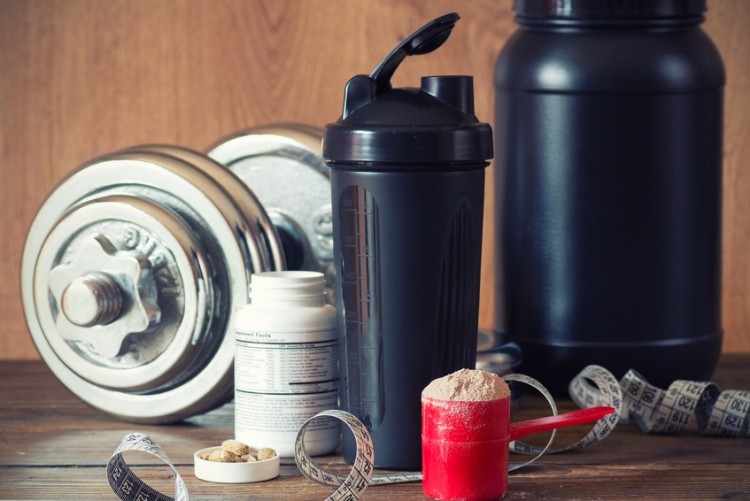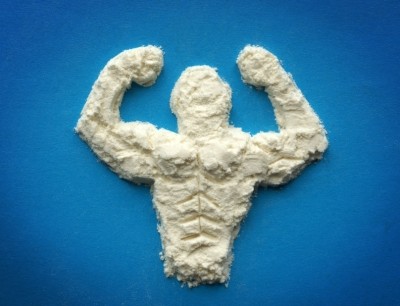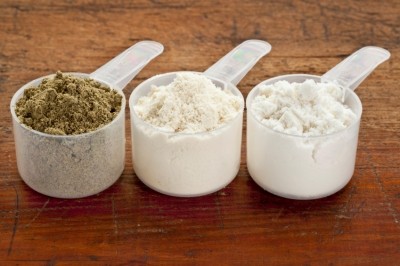Males with more muscle don’t need more protein, study finds

Researchers found individuals consuming 40 g of whey protein after a whole-body resistance exercise programme resulted in a greater muscle response when compared to a 20 g protein dose.
However, the study found an individual’s lean muscle mass did not seem to influence this response.
In addition, the researchers’ findings suggest the amount of protein required by muscles immediately after exercise may depend on the type of workout performed.
The findings seem to contradict recommendations outlined by the British Nutrition Foundation and the American College of Sports Medicine.
Here, the guidelines state weightlifters do not need more than around 25 g of protein after exercise to maximally stimulate the muscle’s ability to grow.
Recent evidence does suggest that a 20–25 g dose of high quality protein is enough to maximally stimulate muscle growth after resistance exercise in young adults.
Individuals that ingested 40 g of egg protein following bilateral leg resistance exercise resulted in a similar muscle growth response compared with 20 g of egg protein.
Flexing study criteria

Researchers from the University of Stirling began by enrolling 30 healthy, resistance-trained males in their early twenties.
These subjects, which had been attending more than 2 training sessions per week for the previous 6 months, were then placed in either the lower lean body mass (LLBM) group (LBM lower than 65kg) or the higher lean body mass (HLBM) group (higher than 70 kg).
The two groups then entered a randomised, double-blind, crossover design, where the males were asked to ingest either 20 or 40 g of whey protein isolate as a 500 mL drink immediately after exercise.
The order of infusion trials, and thus dose of ingested protein, was randomised and an independent investigator prepared the drinks. Each trial was separated by approximately 2 weeks.
Each male received two infusions of an isotope tracer and a series of muscle biopsies in order to measure the degree of muscle growth.
“In our study, participants completed a bout of whole-body resistance exercise, where earlier studies - on which protein recommendations are based - examined the response to leg-only exercise,” said Dr Kevin Tipton, professor of Sport, Health and Exercise Science at the University of Stirling.
“This difference suggests the amount of muscle worked in a single session has a bigger impact on the amount of protein needed afterwards, than the amount of muscle in the body.”
Tipton explained that the results pointed towards the volume of the resistance exercise bout as an important component.
“As for muscle response from carrying out isolation, compound, or full-body exercises, our results suggest that the metabolic response might be different. But, we don’t know for sure if that impacts the muscle growth.”
The role of genetics

The team hypothesized that the most likely explanation for the difference in muscle growth response to resistance exercise and protein ingestion was the amount of muscle activated during the exercise bout.
The overall protein demand following a session of whole-body resistance exercise was superior in comparison to a session of unilateral or bilateral leg resistance exercise.
Additionally, nutritive blood flow increases after resistance exercise easing the delivery of proteins to the working muscle. Resistance exercise also increase protein transport and uptake into the muscle.
Therefore, the results agree with the notion that the more muscle activated the more protein will be taken up by muscle after exercise.
Dr Colin Moran, senior lecturer in Health and Exercise Sciences at the University of Stirling, commented on the genetic aspect of muscle growth and protein uptake saying that genetic variation plays a very significant role in muscle function.
“It seems that between 30% and 80% of the differences between individuals in muscle function can be explained by genetics.”
“This genetic variation will contribute to a range of physiological differences, including structural differences in the muscle, differences in the proportion of fibre types, the rate of contraction, etc.”
“It will almost certainly include variation in our abilities to take up certain amounts of protein (whether at the level of the gut or the level of the cell). So, will the maximum amount of useful protein differ between individuals? Almost definitely.”
This study was funded by a grant from GlaxoSmithKline Consumer Healthcare.
Source: Psychological Reports
Published online ahead of print, doi:10.14814/phy2.12893
“The response of muscle protein synthesis following whole-body resistance exercise is greater following 40g than 20g of ingested whey protein.”
Authors: Kevin Tipton et al.















